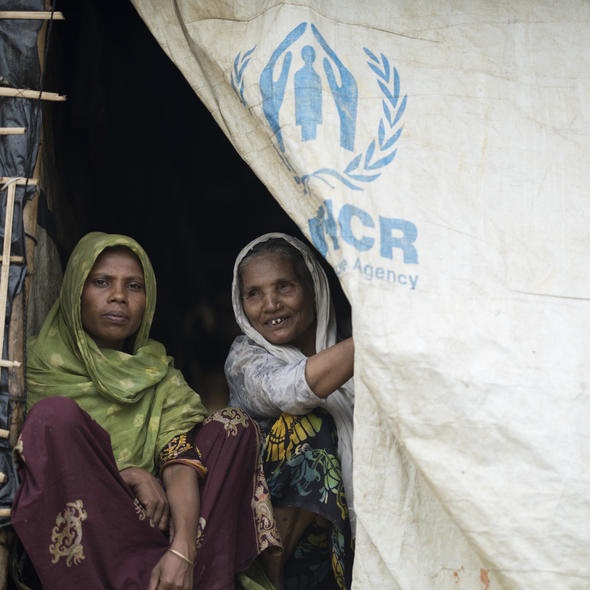Post-Distribution Monitoring Cash-Based Interventions - July 2018
Bangladesh, 2018
Get MicrodataIdentification
UNHCR_BGD_PDM_2018_JULY_v2.1
Post-Distribution Monitoring Cash-Based Interventions - July 2018
| Name | Country code |
|---|---|
| Bangladesh | BGD |
The Rohingya refugee population living in settlements in Cox’s Bazar is dependent on international assistance. Presently, there are limits on how self-sufficient refugees can be, as they have restricted freedom of movement beyond the areas where the settlements are and also have no right to work. In addition, there is insufficient land within their settlements to support subsistence farming. As a result, many refugees are unable to access cash independently to support themselves, and many struggle for the basic necessities not already covered by humanitarian assistance. All current assistance in the form of in-kind distributions and services are free of charge. This includes, for example, food, shelter materials, household items and health services. A number of cash-for-work schemes were designed to support and manage some of the basic services and works in the camps; however, to date, they have not created sufficient income opportunities for refugees or host communities. Likewise, our teams have confirmed that some humanitarian aid items are being sold at local markets. This shows refugees are adopting other, and potentially harmful, coping mechanisms to generate cash for their needs that are not, or not fully, covered by current humanitarian assistance. Negative coping strategies such as food borrowing, reduction in the number of meals and reduced consumption of preferred foods are witnessed across the entire Rohingya refugee population. Between April and May 2018, UNHCR piloted the delivery of unconditional and unrestricted Multipurpose Cash Grants (MPGs) to cover unmet basic needs. This extended to all residents of Camp 5 and Camp 6 in the Kutupalong refugee settlement and was equivalent to approximately half of the monthly Minimum Expenditure Basket (MEB) for a family of five.
After completing the delivery of the grants, UNHCR conducted a detailed Post-Distribution Monitoring (PDM) survey (320 households were interviewed). A Post-Distribution Monitoring (PDM) survey is a mechanism to collect and understand refugees’ feedback on the assistance provided by humanitarian agencies like UNHCR. PDMs are widely used by UNHCR and help to evaluate the effectiveness of the assistance provided directly by UNHCR or through its partners. A PDM is conducted independently from the distribution exercise itself, but closely following it in time. This PDM was intended to evaluate the adequacy of the cash grant provided as well as patterns in its use. It also sought to identify challenges and constraints experienced, and seek refugees’ feedback on any improvements required to implement similar assistance again in the future.
The PDM supports a hypothesis that the current basic in-kind assistance packages provided to refugees are not sufficient to meet all demonstrated needs, with the result that potentially harmful coping mechanisms like selling assistance are employed. The adoption of this cash programme by UNHCR, therefore, seeks to ensure that refugees can address their multiple needs in accordance with their household and personal priorities, including benefits such as greater access to a more diversified diet, better hygiene or shelter improvements.
Household.
Version
2.1: Edited, anonymous dataset for licensed distribution.
Scope
The scope includes:
- Respondent charateristics
- Assistance received
- Information about how the cash was spent
- Other sources of support
- Risks perceived
- Problems encountered
- Items/services bought with cash received
- Prices and market
- Feedback on cash assistance
| Topic |
|---|
| Cash Assistance |
Coverage
Camp 5 and Camp 6 in the Kutupalong refugee settlement.
Producers and sponsors
| Name |
|---|
| UNHCR |
Sampling
For this PDM exercise, samples of 160 households from each camp (5 and 6) were randomly selected – for a total of 320 households. They are selected with a 95% confidence level and a 5% margin of error. The selected sample includes a 20% buffer to achieve a desired level of statistical significance and precision amongst the targeted population. The households that participated during the survey were geo-referenced using GPS. The GPS coordinates of surveyed households were sourced from data collected in the field during a Family Counting Exercise conducted by UNHCR and the Refugee Relief and Repatriation Commissioner’s (RRRC) office from October to November 2017. This was part of a Linking Exercise4conducted from January to February 2018. In general, the GPS readings for most households were accurate (=15 meters). To ensure the confidentiality of respondents, the sampled households were selected randomly using an ArcGIS sampling tool.
Sample weights for household data were computed dividing, for each camp, the population by the sample size.
Survey instrument
The questionnaire contains the following sections: Interviewee details and household demographics, Receiving and spending the cash assistance (basic facts), Risks and problems, Markets and prices, Expenditure, Medium-term outcomes, Accountability to affected populations
Data collection
| Start | End |
|---|---|
| 2018-05-14 | 2018-05-20 |
| Name |
|---|
| United Nations High Commissioner for Refugees |
Seven trained independent enumerators collected the primary data from randomly-selected households using a standard questionnaire. The data was collected using Kobo – a web-based data collection system.
Data processing
Data was edited and anonymised with recoding and local suppression. Four observations were removed because they presented a high individual risk of reidentification.
Data Access
Cite as follow:
UNHCR (2018) Post-Distribution Monitoring Cash-Based Interventions. UNHCR microdata library: https://microdata.unhcr.org
Contacts
| Name | Affiliation | |
|---|---|---|
| Curation team | UNHCR | microdata@unhcr.org |
